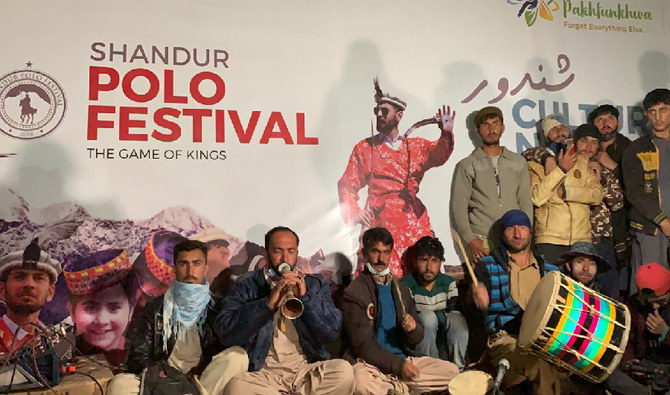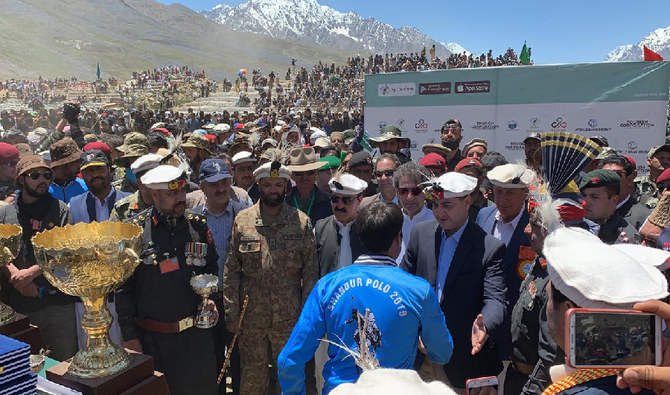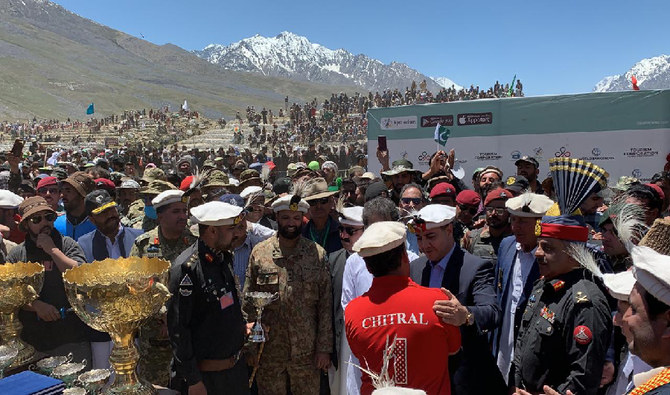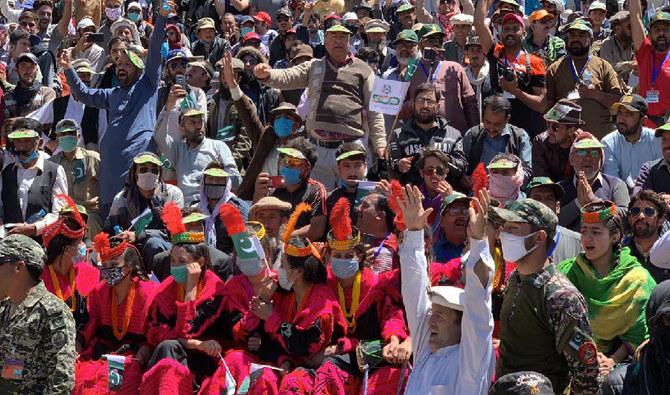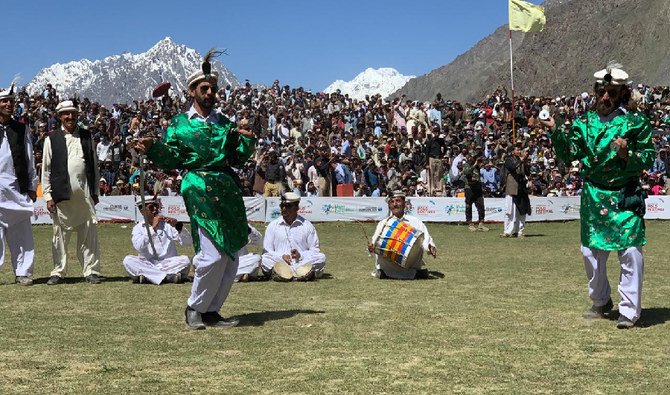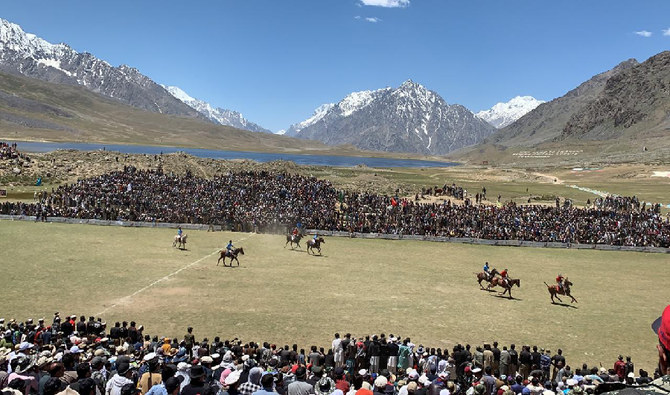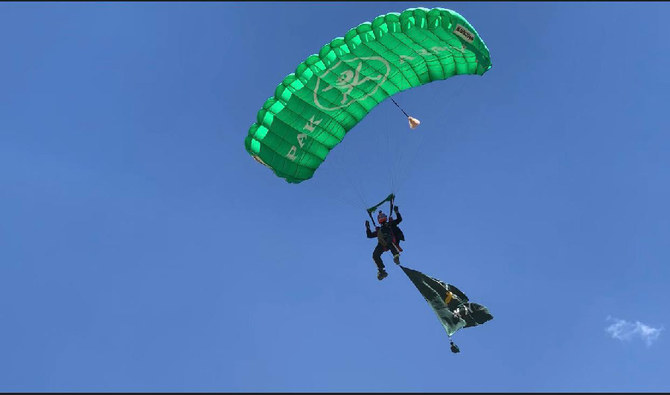SHANDUR: The Shandur Polo trophy went to team Chitral for the fourth consecutive year after they beat arch-rivals Gilgit by 6-5 in a nail-biting final match of The Shandur Polo Festival 2019.
Played at the world’s highest polo ground at 12,500 feet above the sea-level, the final remained a close contest for most of the time as challengers Gilgit leveled Chitral’s lead midway through the second half. However, Chitral kept their nerves and scored a spectacular goal just minutes before the final whistle.
Peshawar Corps Commander Mazhar Shaheen Mehmood presented the winners' trophy to Chitral captain Shehzada Sikandar ul Mulk. Chitral’s Izhar Ali Khan was declared man of the match for his outstanding performance.
Khyber Pakhtunkhwa’s Senior Minister for Sports and Tourism Muhammad Atif Khan told Arab News that the Shandur Festival was attracting more local and foreign tourists every year. “The number has doubled since last year. The picturesque Shandur valley has the potential to attract many more tourists around the year. Our government is trying to improve the roads and provide better facilities for all tourists. Shandur festival can play a vital role in promoting tourism in Pakistan.”
More than 40,000 tourists visited the three-day festival this year, Commissioner of Malakand Riaz Khan Mehsud told Arab News.
“Polo is extremely popular in Chitral and Gilgit. Thousands of local families came to Shandur every day to back their respective teams. Around 80 foreigners from different countries also visited Shandur Festival,” Mehsud said, adding that a 13-member polo team from the United Kingdom came to Shandur to witness how the players and their horses cope with such high-altitude where breathing becomes difficult due to lack of oxygen.
Musical attractions representing the cultures of Chitral, Gilgit, and Baltistan coupled with spectacular fireworks energized the night before the final match in Shandur.
Dutch nationals Levie and Lucas traveled to Shandur with a group of their bag-packers from their country after seeing the Khyber Pakhtunkhwa Tourism Corporation (TCKP) advertisements on the social media. “We arrived here yesterday via Gilgit. Everyone treats us like VIPs. Everybody is so welcoming. The greenery and snow-clad mountains of Shandur and this wonderful game of polo are all amazing,” The couple expressed the joy of their first visit to Pakistan.
Amirullah Khan Yaftali has been performing the responsibilities of the tournament referee for the past 12 years. “The 50 minutes match consists of two halves. Each team consists of six players. You can not change an injured player or horse during the match”, he detailed, adding that only a special breed of horses from Badakhshan, Afghanistan can play at such high-altitude.
Lamenting the poor road conditions, Amirullah Yaftali said that promoting tourism greatly depended on better accessibility to tourists stations.”Thousands of domestic tourists from different parts of Pakistan brave the nerve-wrecking journey to reach Shandur. However, deteriorated road conditions have hampered the KP government’s efforts to promote the Polo festival and tourism as anyone visiting Shandur once wouldn’t want to return.”
Shandur is located 67 kilometers from Mastuj Town in Upper Chitral. However, the journey often takes over six painstaking hours as the unmetalled road tests the nerves and skills of drivers due to narrow passageways and sharp turns, and long delays due to traffic congestions.
Despite various challenges, the TCKP has successfully organized Shandur festival, managing to bring more colors and attracting more visitors. The corporation aims to invest more resources and efforts on the festival in an attempt of giving it international fame.
Three-day Shandur polo festival concludes with record 40,000 visitors
Three-day Shandur polo festival concludes with record 40,000 visitors

- Dutch backpakers and a British polo team were among the 80 foreign tourists at the festival
- The tournament is played at the world’s highest polo ground at 12,500 feet above sea-level
Indian Sikh pilgrims to visit Kartarpur today to mark birth anniversary of religion’s founder

- Sikh pilgrims from India cross over into Pakistan every year via visa-free Kartarpur Corridor
- Gurdwara Darbar Sahib in Kartarpur, Narowal, is Sikhism founder’s final resting place
ISLAMABAD: Indian Sikh pilgrims will visit Gurdwara Darbar Sahib in the eastern Kartarpur town today, Monday, to mark the 555th birth anniversary of their religion’s founder Baba Guru Nanak Dev Ji, state media reported.
Every year Indian Sikh pilgrims cross over from India to Pakistan via a visa-free border crossing known as the Kartarpur Corridor. The corridor connects Gurdwara Darbar Sahib, near Narowal in Pakistan’s Punjab, to Gurudwara Dera Baba Nanak in Indian Punjab’s Gurdaspur district.
Inaugurated in 2019, the corridor is seen as a rare example of cooperation and diplomacy between the two South Asian neighbors.
“Sikh pilgrims will visit Gurdwara Darbar Sahib Kartarpur on Monday to celebrate the 555th birth anniversary of Baba Guru Nanak Dev Ji,” state broadcaster Radio Pakistan reported.
It said that the pilgrims would visit Gurdwara Rohri Sahib in Eminabad on Wednesday before concluding their journey in Pakistan’s eastern city of Lahore.
Much of Sikh heritage is located in Pakistan. When Pakistan was carved out of India at the end of British rule in 1947, Kartarpur ended up on the Pakistani side of the border, while most of the region’s Sikhs remained on the other side.
For over seven decades, the Sikh community had lobbied for easier access to their holiest temple.
Pakistan’s initiative to open the corridor earned widespread appreciation from the international community, including the United Nations Secretary-General António Guterres, who had described it as a “Corridor of Hope.”
Fly Jinnah celebrates inaugural Lahore-Dammam flight amid Saudi expansion

- Pakistan’s low-cost airline began domestic operations in 2022 and is now focusing on the Middle East
- Fly Jinnah has also been connecting Pakistani cities to Sharjah, Riyadh and Jeddah, as PIA struggles
KARACHI: Fly Jinnah, Pakistan’s low-cost airline, celebrated its inaugural flight from Lahore to Dammam on Sunday, further enhancing air connectivity between the South Asian nation and Saudi Arabia amid growing demand for international travel.
Established in 2021 as a joint venture between Pakistan’s Lakson Group and the United Arab Emirates’ Air Arabia Group, Fly Jinnah began domestic operations in October 2022, connecting major Pakistani cities such as Karachi, Islamabad, Lahore, Peshawar and Quetta.
In February 2024, the airline launched its first international route, connecting Islamabad to Sharjah, before expanding to Saudi Arabia— home to an estimated 2.7 million Pakistanis— with flights to Riyadh and Jeddah.
“We are happy to celebrate our inaugural flight from Lahore to Dammam, further enhancing connectivity between Pakistan and Saudi Arabia for our passengers,” the airline said in a social media post.
The first flight to Dammam in the kingdom’s Eastern Province was operated a day earlier. A substantial number of Pakistani families reside in and around the Saudi city, drawn by job opportunities in the oil-rich region.
The addition of Dammam to its network highlights Fly Jinnah’s aim to capture the lucrative Middle Eastern travel market as Pakistan International Airlines (PIA), the struggling national carrier, faces financial challenges.
The Pakistani government has been exploring privatization options for PIA, leaving a gap that private airlines such as Fly Jinnah aim to fill.
Saudi Arabia is a key destination for Pakistani travelers, driven by religious pilgrimage to Makkah and Madinah and by a thriving expatriate workforce.
Fly Jinnah’s direct connections offer affordable travel options, positioning the airline as a viable competitor in this high-demand sector.
Pakistan dispatches 19th relief consignment to Syria amid conflicts in Middle East

- Pakistan says it will continue to support people affected by Israel’s military campaign in the region
- Since the beginning of the war in Gaza, Pakistan has called for a ceasefire at the UN, other forums
ISLAMABAD: Pakistan’s National Disaster Management Authority (NDMA) dispatched its 19th relief consignment on Sunday to help war-affected people in Syria and refugees from Lebanon, according to an official statement, reaffirming the country’s commitment to supporting those impacted by ongoing conflicts in the Middle East.
The aid shipment, sent in collaboration with the Pakistani charity Al-Khidmat Foundation, consisted of 17 tons of humanitarian supplies, including buckets, powdered milk, tinned food, family packs, sleeping bags and medical kits.
The consignment departed via a chartered flight from Jinnah International Airport in Karachi to Damascus in Syria.
“This 19th consignment has been dispatched for the people of Syria and refugees from Lebanon,” the NDMA said in its statement. “Prior to this, the Government of Pakistan has sent 12 aid consignments to Palestine and six shipments to Lebanon, with a total volume of 1,722 tons.”
The statement reaffirmed Pakistan’s commitment to supporting the people of Palestine and Lebanon who are in distress due to Israel’s military campaigns in the region.
It also emphasized the importance of collaboration by welfare organizations and the Pakistani public in strengthening the government’s efforts to assist those in need.
Pakistan has already established a special fund titled the “Prime Minister’s Relief Fund for Gaza and Lebanon,” inviting public donations.
Since the beginning of the war in October last year, Pakistan has called for a ceasefire in Gaza and has raised the issue at the United Nations, the Organization of Islamic Cooperation (OIC) and other international forums, urging an end to Israeli military actions and a resolution to the humanitarian crisis.
Women in Pakistan’s Karachi protest against honor killings, rising extremism

- Participants of the rally say Karo-Kari is ‘rampant’ in Sindh, oppose marriages to settle disputes
- Protesters also raise concern about proposed amendments to Pakistan’s water distribution system
KARACHI: Hundreds of women marched in Karachi on Sunday to protest honor killings, rising extremism and social injustices, while voicing concerns over proposed changes to Pakistan’s water distribution mechanism earlier this year, which southern provinces argue are detrimental to their interests.
The rally, organized by Sindhiyani Tehreek, a women-led movement supported by civil society groups, drew demonstrators from across Sindh who marched from Regal Chowk to the Karachi Press Club.
Dr. Marvi Sindhu, the central general secretary of the movement, highlighted the threat of so-called honor killings, locally referred to as Karo-Kari. These killings target individuals accused of engaging in illicit relationships or marrying against their families’ wishes, often as a means to restore the perceived honor of the family.
“We are raising our voices against the rampant killing of women in the name of honor in Sindh,” she told Arab News. “We are also here to raise our voices against rising religious extremism.”
Sindhu said Karo-Kari was “alarmingly rampant” in northern Sindh, though she noted other socially conservative practices also undermined the interests and wellbeing of women.
“Women are married to settle disputes or murder cases [in the province], only to face harassment [from their in-laws] for the rest of their lives,” she continued, urging Pakistan’s senior judiciary to form a commission to address such issues.
Amar Sindhu, a professor and member of the Women’s Action Forum, echoed similar concerns, saying the rise in extremist ideologies was deepening social injustices and threatening women’s safety in Sindh.
“We stand united against these injustices and demand action to protect women from violence and oppression,” she said.
Sindhiyani Tehreek, founded in 1980, has been a prominent force in the province, advocating for women’s rights, social justice and the preservation of Sindhi culture. The movement also has a long history of resistance against authoritarian rule, gender-based violence and environmental degradation.
Apart from social and gender issues, the protest also highlighted proposed amendments to the Indus River System Authority (IRSA) Act, 1992, introduced in July to restructure Pakistan’s water regulatory authority.
Key changes include appointing a permanent federal chairman to the authority, replacing the current rotational system where provincial representatives take turns leading IRSA.
The movement’s general secretary condemned the amendments as “unlawful,” warning they could exacerbate interprovincial disputes and deprive Sindh of its rightful share of water.
“Sindh deserves its share of water to sustain its crops, mangroves and marine life,” she said.
One killed in northwestern Pakistan blast targeting religio-political party leader

- Attack on Maulana Shehzad Wazir of Jamiat Ulema-e-Islam has left him critically injured
- The JUI leader was on his way to a mosque in Azam Warsak when the explosion took place
PESHAWAR: One person was killed and six others injured in a blast triggered by an improvised explosive device (IED) targeting a senior leader of a prominent religio-political party in South Waziristan district on Sunday, leaving him in critical condition, police said.
The attack on Maulana Shehzad Wazir comes amid complaints from his Jamiat Ulema-e-Islam (JUI) party about being targeted by militants operating in Pakistan’s northwestern Khyber Pakhtunkhwa (KP) province.
JUI chief Maulana Fazlur Rehman also voiced concerns over militant threats disrupting the party’s election campaign in the region ahead of the February 8 national polls, citing warnings from law enforcement about dangers to its candidates.
“The IED was planted in a street leading to Maulana Shehzad Wazir’s mosque, who is politically affiliated with the JUI-F,” Bilal Wazir, a police officer in Wana, the headquarters of South Waziristan tribal district, told Arab News over the phone. “Mufti Ijaz Wazir died on the spot while six others, including Maulana Shehzad Wazir, who was apparently the target of the attack, were left in critical condition.”
The officer said a police contingent was dispatched to the area soon after the explosion to gather evidence and shift the wounded to the hospital.
Asked about the intensity of the blast, he said it shook the entire neighborhood of Azam Warsak, a settlement on the outskirts of Wana.
Speaking to Arab News, Mufti Ijaz Shinwari, the JUI senior vice president in the tribal area, condemned the incident, saying the victims of the attack were religious leaders and key figures of his political party on the provincial level.
“This is inhumane,” he added. “This is clearly a terrorist attack and a cowardly act.”
No group has claimed responsibility for the attack, though Tehreek-e-Taliban Pakistan (TTP), a banned militant group, has a history of targeting civilians, security forces and politicians in the region, aiming to perpetuate instability in KP.
In recent months, the TTP has claimed responsibility for several attacks and is suspected by officials in others.
Earlier this week, however, Daesh, a separate militant outfit, shot dead Hameed Sufi, a senior leader of the Jamaat-e-Islami party, in the adjacent Bajaur tribal district.
In June, four people, including Maulana Mirza Jan, the president of JUI’s Wana chapter, were shot by unidentified attackers.
Pakistan claims Afghanistan’s Taliban rulers are providing shelter to TTP fighters across the porous border separating the two countries. However, the Afghan Taliban insists they do not allow anyone to use their soil to launch violent attacks in the neighborhood.



